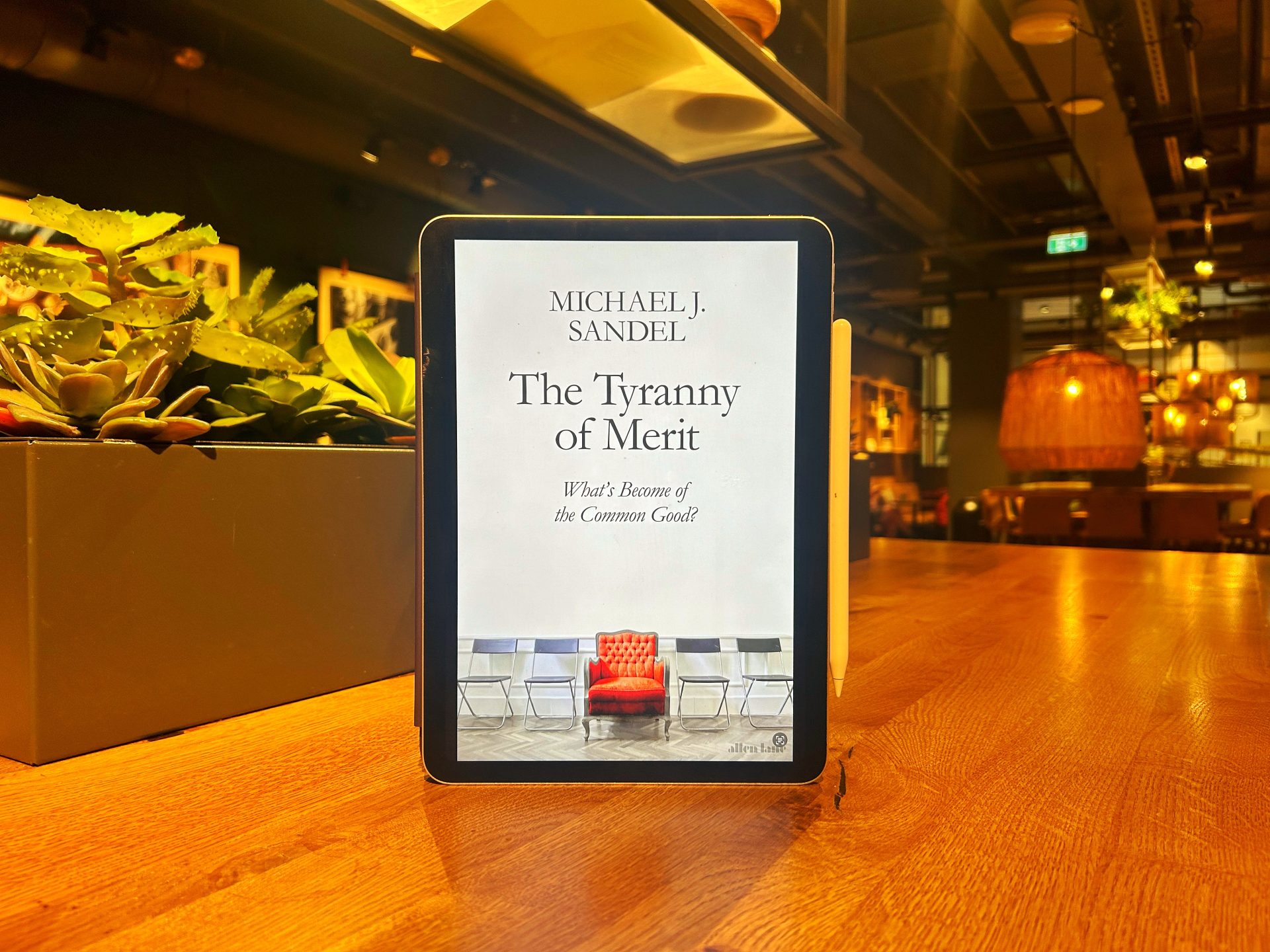Believing in meritocracy can blind us to our shared humanity. While the idea that “you can make it if you try” sounds motivating, it can be both inspiring and damaging. Many people work incredibly hard but still can’t access formal education due to circumstances beyond their control. Despite their efforts, they often earn less and receive less respect than those who don’t work as hard. It’s unfair to label them as lazy when they toil long hours and still struggle to make ends meet. They aren’t lazy; they’re just less fortunate. This stark reality underscores the inherent unfairness of life and the tough challenges many face, widening the gap of inequality and worsening societal divides.
The Tyranny of Merit explores the history and ideas behind merit, exposing its darker side. The book critiques the concept of meritocracy, arguing that no matter how perfect it is, our implementation is flawed. It raises the issue of how meritocracy shapes our views on success, fairness, and societal values, often leading to negative consequences.
While the book didn’t completely change my perspective—I already believe we shouldn’t judge people based on their job, wealth, or education—it did help me understand complex issues that I struggled to articulate. It answered some of my political questions and clarified complicated topics, making it an enlightening read.
Summary
The problem with meritocracy
A perfect meritocracy still raises ethical questions. Even in a fair meritocracy, people often believe their success is entirely their own achievement. This belief makes it difficult to see our interconnectedness and shared responsibilities.
The debates are not just about fairness but also about how we view success and failure, winning and losing, and the attitudes successful people should have toward those who are less successful. The belief that hard work and talent can elevate anyone is increasingly out of touch with reality. Rising inequality highlights the need to address power and wealth disparities directly. Do the talented deserve outsized rewards? Our talents are often not our own doing, making it difficult to justify why those with market-prized talents should be more rewarded than equally hardworking individuals with different abilities.
Modern society equates success with virtue. This view, while empowering, fosters a lack of empathy for the less fortunate, as their struggles are seen as personal failures.
Success ethics
Meritocratic success feels earned, unlike inherited aristocratic privilege. However, being poor in a meritocracy is demoralizing, as it implies personal failure. This societal judgment is harsh and divisive.
Well-educated governance
While having educated leaders is generally positive, it doesn’t guarantee good governance. Historical evidence shows little correlation between academic credentials and effective political judgment. Moreover, educated elites often hold prejudices against the less-educated, exacerbating social divides.
The downsides of meritocracy
Meritocracy’s emphasis on personal responsibility can be harmful. It ignores the roles of luck and grace, fostering a harsh, judgmental society. This mindset, prevalent across political spectrums, deepens social inequality.
Alternatives to meritocracy
- Free-Market Liberalism: Advocated by Friedrich A. Hayek, this approach rejects government intervention to reduce inequality, focusing on formal equality before the law and market-driven outcomes.
- Welfare State Liberalism: John Rawls argues for redistributive taxation, recognizing the moral arbitrariness of talent and advocating for a community’s role in individual success.
Merit and the common good
Recognizing that success is often a product of luck and communal support, rather than solely personal effort, can inspire humility and a more generous public life. This perspective encourages moving beyond the divisive ethic of merit towards a more inclusive and compassionate society.
Why do the successful owe anything to the less-advantaged members of society? The answer to this question depends on recognizing that, for all our striving, we are not self-made and self-sufficient; finding ourselves in a society that process our talents is our good fortune, not our due. A lively sense of the contingency of our lot can inspire a certain humility: “There, but for the grace of God, or the accident of birth, or the mystery of fate, go I.” Such humility is the beginning of the way back from the harsh ethic of success that drives us apart. It points beyond the tyranny of merit toward a less rancorous, more generous public life.
Michael J. Sandel, The Tyranny of Merit: What’s Become the Common of Good?
My Favorite Bits
While it is true that admission reflects dedication and hard work, it cannot really be said that it is solely their own doing. What about the parents and teachers who helped them on their way? What about talents and gifts not wholly of their making? What about the goof fortune to live in a society tat cultivates and rewards the talents they happen to have?
Michael J. Sandel, The Tyranny of Merit: What’s Become the Common of Good?
Our disagreements about merit are not only about fairness. They are also about how we define success and failure, winning and losing—and about the attitudes the winners should hold toward those less successful than themselves.
Michael J. Sandel, The Tyranny of Merit: What’s Become the Common of Good?
Meritocratic hubris reflects the tendency of winners to inhale too deeply of their success, to forget the luck and good fortune that helped them on their way. It is the smug conviction of those who land on top that they deserve their fate, and that those on the bottom deserve theirs, too.
Michael J. Sandel, The Tyranny of Merit: What’s Become the Common of Good?
The more we view ourselves as self-made and self-sufficient, the less likely we are to care for the fate of those less fortunate than ourselves. If my success is my own doing, their failure must be their fault. This logic makes meritocracy corrosive of commonality. Too strenuous for our fate makes it hard to imagine ourselves in other people’s house.
Michael J. Sandel, The Tyranny of Merit: What’s Become the Common of Good?
Well-educated elites are no less biased than less-educated folk. Moreover, the elites are unembarrassed by their prejudice. They may denounce racism and sexism but are unapologetic about their negative attitudes toward the less-educated. The reason for this lack of embarrassment relates to the meritocratic emphasis on individual responsibility. Elites dislike those with lesser educations more than they dislike poor people or members of the working class, because they consider poverty and class status to be, at least in part, due to factor’s beyond one’s control. By contrast, they consider low educational achievement to represent a failure of individual effort.The suggestion that education is a universal social problem solver may increase the risk that groups with low levels of socioeconomic status will be especially negatively evaluated while strengthening the ideology of meritocracy. This makes people more willing to accept inequality and more likely to believe that success reflects merit.
Michael J. Sandel, The Tyranny of Merit: What’s Become the Common of Good?
The notion that “the best and the brightest” are better at governing than their less-credentialed fellow citizens is a myth born of meritocratic hubris.
Michael J. Sandel, The Tyranny of Merit: What’s Become the Common of Good?
Allocating jobs and opportunities according to merit does not reduce inequality; it reconfigures inequality to align with ability. But this reconfiguration creates a presumption that people get what they deserve. And this presumption deepens the gap between rich and poor.
Michael J. Sandel, The Tyranny of Merit: What’s Become the Common of Good?
When people complain about meritocracy, the complaint is usually not about the ideal but about our failure to live up to it: the wealthy and powerful have rigged the system to perpetuate their privilege; the professional classes have figured out how to pass their advantages on to their children, converting the meritocracy into a hereditary aristocracy; colleges that claim to select students on merit give an edge to the sons and daughters of the wealthy and the well-connected. According to this complaint, meritocracy is a myth, a distant promise yet to be redeemed.
Michael J. Sandel, The Tyranny of Merit: What’s Become the Common of Good?
The meritocratic ideal is not a remedy for inequality; it is a justification of inequality.
Michael J. Sandel, The Tyranny of Merit: What’s Become the Common of Good?
We should figure out how to make success in life less dependent on having a college degree. Begin by taking seriously the various forms of learning and training that prepare people to undertake it. This means reversing the retreat form public higher education, overcoming the neglect of technical and vocational education, and breaking down the sharp distinction, in funding and prestige, between colleges and other post-secondary educational settings.
Michael J. Sandel, The Tyranny of Merit: What’s Become the Common of Good?
Author: Michael J. Sandel
Publication date: 15 September 2020
Number of pages: 272 pages





Leave a Reply